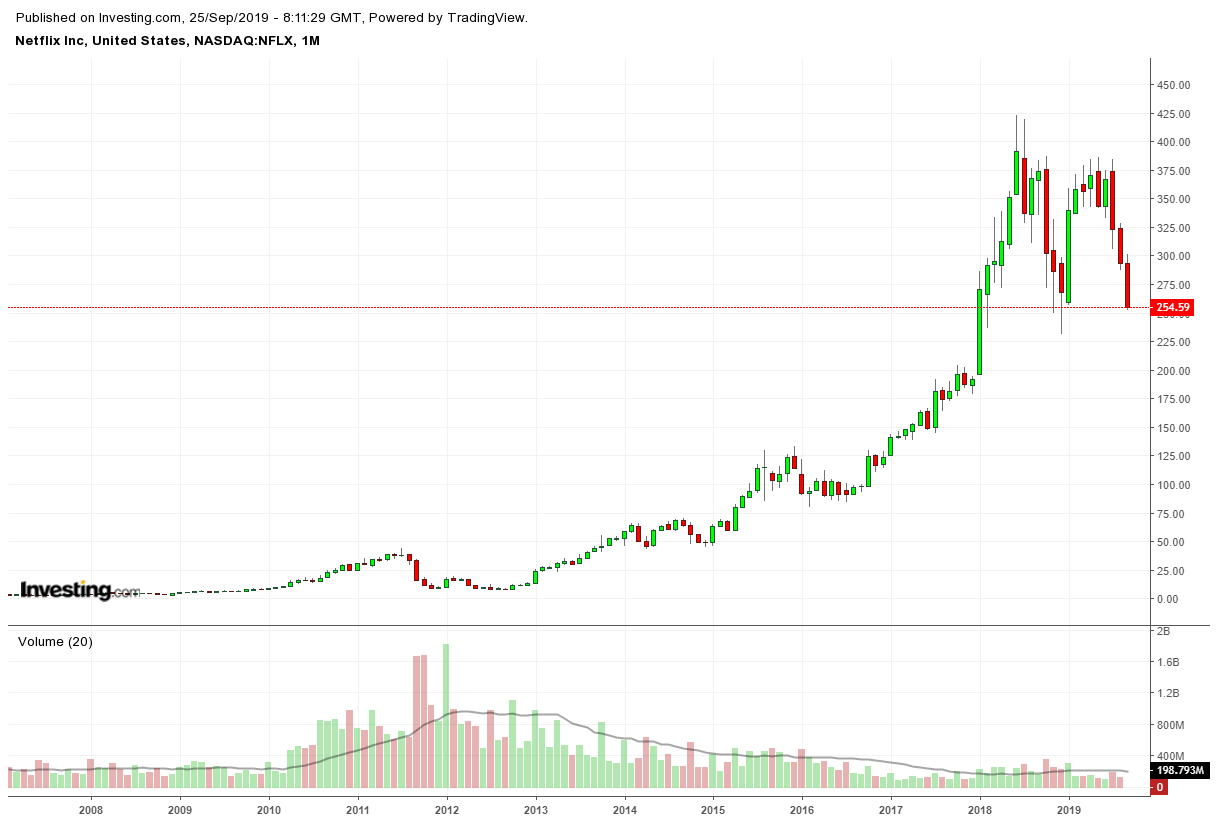Remember Blockbuster? For those too young to recognize the name, the once publicly-traded, national chain of video rental stores thrived throughout the 1990s and early 2000s. At its peak, Blockbuster boasted over 900 outlets, dominating its segment of the entertainment industry. For a time it seemed invincible.
Then, beginning in 1997, Netflix (NASDAQ:NFLX) quietly started disrupting Blockbuster’s bricks-and-mortar distribution model, offering a better video rental service. The once-mighty Blockbuster has since been liquidated, with just one store in Bend, Oregon remaining.
Since it pivoted to streaming videos in 2007, Netflix's dominance has grown. For the past decade it has owned the segment. Indeed, since 2007 Netflix has become a $116 billion company; revenue increased from $1.2 billion in 2007 to $15.7 billion in 2018, a jump of 1200%.

But taking out Blockbuster wasn't the endgame. Over the past few years Netflix has moved away from simply renting movies to actually producing them—a high risk / high reward bet that original content would pull in new subscribers and keep the existing audience engaged. The downside? The massive costs involved in producing that content. Still, the effort and outlay have positioned Netflix as the industry leader, a streaming powerhouse and arguably, made it invincible...until now.
But competition is heating up and Netflix is actually much more vulnerable than surface fundamentals make it appear.
Growing Debt Problem
Netflix’s industry dominance was never fueled by its profits. Rather, the company benefited from first mover advantage and invested aggressively to keep that lead. Plus its competition remained sparse for quite some time.
Though Netflix has been profitable for a decade, 2018 was the first year it came in at over $1 billion dollars. The company's primary focus was always on user growth.
Netflix’s cash flow statements tell the real tale: over the past four years, the California-based company has lost $6.6 billion from operations. That's directly related to the fact that producing, creating and licensing content is a costly endeavor. It requires time, expertise, equipment and significant staffing among other things.
For example, each of the six episodes of the final season of Game of Thrones is said to have cost about $15 million dollars. Add to that consumers' insatiable appetite for more and more high-quality, fresh content, and it rapidly becomes an endless spending loop, something that's apparent in Netflix’s financial reports.
So how do you lose $6.6 billion from operations over four years and continue to stay in business? The answer is simple, but potentially risky: raise debt and lots of it.
Netflix has accomplished this at an astounding rate: it's added $9.5 billion in debt over the past four years to finance the operation. The problem, to be clear, isn't the debt itself. Leveraging assets to make more money is often how businesses grow. And Wall Street doesn’t mind financing a money-losing business as long as it continues growing. However, once the subscribers turn elsewhere, Netflix's problems start.
Streaming Wars
At the end of 2007, Netflix had 7.5 million subscribers. As of its most recent, Q2 2019 earnings report it had 151 million subscribers. It's therefore safe to say Netflix did well as the only major player in its corner of the industry. A major series of competitive shifts, however, could be the first tremors signaling a major seismic shift that will take out that dominance.
First, last quarter, Netflix lost 130 thousand paid subscribers in the U.S. That alone should be a significant red flag for any debt-fueled company.
Next, consider the avalanche of new offerings scheduled for the coming year, each fighting for Netflix customers: Disney+ (NYSE:DIS) is set to launch in November; Apple TV (NASDAQ:AAPL) is slated to go live in November as well; AT&T’s (NYSE:T) WarnerMedia streaming service HBO Max is now in beta; and NBC (NASDAQ:CMCSA) recently announced it was developing Peacock, its own streaming service.
Add all that to the existing pool of streaming services, including Hulu, HBO Go and Amazon Prime (NASDAQ:AMZN). Of course, some will inevitably fail, killed by the competitive environment. And that's before the steps some of the new services are taking to undermine contenders.
A standard Netflix subscription costs $12.99. Disney has priced its offering at $6.99, initially considered market breaking. Then Apple introduced Apple TV for $4.99, undercutting the undercutters.
From what we know about Netflix’s business model, these prices can’t be profitable for Disney or Apple. Netflix's $12.99 fee was put in place after the company realized lower prices were unsustainable—particularly for a company nurtured by debt rather than by its own operations.
Operational debt is precisely why Netflix will be on the losing side of the streaming wars. Both Disney and Apple are swimming in cash. In 2018, Disney brought in $14 billion from operations while Apple made a staggering $77 billion.
With numbers like that, both companies should be able to run their streaming operations at a loss, for years if they wish. Apple could possibly do so forever.
On the other hand, Netflix will have to either scale back massively or rely yet again on Wall Street for funding, even as the probability of investors remaining positive on Netflix decreases with every subscriber who leaves the service.
Competitors are also using their financial capabilities to pry away Netflix's legacy shows. Friends, the most popular show on Netflix, will be leaving for HBO Max in 2020. The Big Bang Theory, another hit, is in talks to shift to HBO Max as well. The Office will be leaving in 2020 as well, for NBC’s offering. To fight back, Netflix just licensed Seinfeld for $500 million.
Still, whatever it does, Netflix will continue to be constrained by its financials while many competitors won’t. That will make all the difference in who will eventually win these streaming wars.
